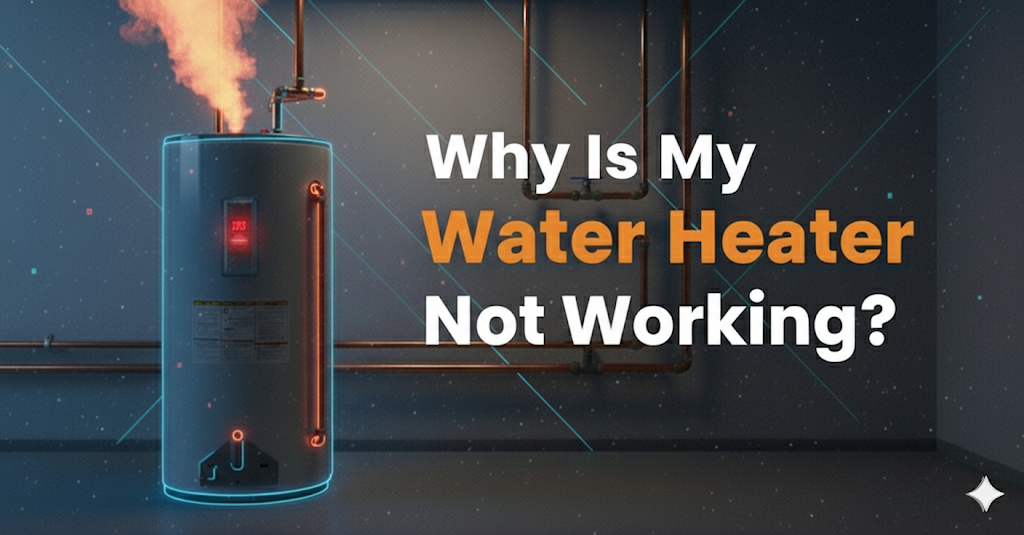Hot water is one of those comforts in life that we often take for granted—until it suddenly disappears. Whether you’re stepping into a cold shower on a chilly Canadian morning or struggling to run your dishwasher, the frustration is the same. If you’re asking yourself, “Why Is My Water Heater Not Working?”, you’re not alone. This issue is one of the most common household problems across Canada.
In this detailed guide, we’ll break down the most common reasons why water heaters fail, how you can troubleshoot, and when to call in experts like GM Heating and Cooling Inc. to get your system back on track.
Understanding the Basics
A water heater is designed to provide a steady flow of hot water for showers, laundry, and cleaning. But when something goes wrong, it can be caused by issues ranging from minor to major. Common culprits include:
- Sediment buildup in the tank
- Faulty thermostat settings
- Pilot light or ignition failures (for gas heaters)
- Electrical issues (for electric heaters)
- Gas supply interruptions
- Worn-out parts such as dip tubes or valves
Before we explore these in detail, remember: while some problems are easy fixes, others require the expertise of a licensed HVAC professional.
Why Is My Water Heater Not Working? Sediment Buildup Problems
In Canada, many regions deal with hard water, which contains minerals like calcium and magnesium. Over time, these minerals settle at the bottom of your water heater tank, creating sediment buildup.
Signs of sediment buildup include:
- Reduced hot water supply
- Strange popping or rumbling noises
- Increased energy bills due to inefficiency
- Longer wait times for water to heat
Solution:
Flushing your water heater tank once or twice a year can prevent this issue. If sediment buildup is already severe, you may need a professional cleaning. At GM Heating and Cooling Inc., we provide thorough maintenance services to extend the life of your water heater.
Thermostat Troubles
The thermostat controls your water heater’s temperature. If it’s faulty or misconfigured, your hot water may be too cold, too hot, or fluctuate unpredictably.
Common thermostat issues include:
- Incorrect temperature settings
- Faulty wiring or electrical faults
- Worn-out sensors
Solution:
First, check the thermostat setting—it should typically be set to 120°F (49°C) for safety and efficiency. If adjustments don’t help, the thermostat may need repair or replacement.
Pilot Light and Ignition Failures
For gas water heaters, the pilot light or ignition system is essential. If the flame won’t stay lit, your heater can’t function.
Possible causes:
- Drafts extinguishing the flame
- Dirty or faulty thermocouple
- Gas supply interruptions
Solution:
Try relighting the pilot light following manufacturer instructions. If it won’t stay lit, the thermocouple may need replacing. Since dealing with gas can be dangerous, contacting professionals like GM Heating and Cooling Inc. is highly recommended.
Why Is My Water Heater Not Working? Pressure Relief Valve Malfunctions
The temperature and pressure (T&P) relief valve is a critical safety component. If it malfunctions, your water heater may not function properly or may leak.
Warning signs:
- Leaks around the valve
- Inconsistent water pressure
- Noises or hissing from the tank
Solution:
A faulty pressure relief valve often requires replacement. This is a job for trained technicians, as it involves working with high-pressure systems.
Why Is My Water Heater Not Working? Dip Tube Issues
The dip tube directs cold water to the bottom of the tank. When it cracks or deteriorates, cold water mixes with hot water, reducing efficiency.
Signs include:
- Sudden decrease in hot water supply
- Lukewarm water despite full tank capacity
Solution:
Replacing the dip tube restores efficiency, but it requires tank disassembly. For most homeowners, professional service is the safest route.
Electrical Problems in Electric Heaters
If you own an electric water heater, wiring or heating element failures may be the cause.
Look for:
- Circuit breaker tripping repeatedly
- Buzzing or humming sounds
- No hot water at all
Solution:
Check the circuit breaker first. If it trips again, you may have a faulty heating element or wiring problem. Since electrical work involves safety risks, it’s best to contact a licensed electrician or HVAC technician.
Gas Supply Issues
Gas-powered water heaters depend on an uninterrupted fuel supply. If the gas line is blocked, the heater won’t ignite.
Warning signs:
- Burner won’t light
- Smell of gas near the unit
- Sudden loss of hot water
Solution:
Make sure the gas valve is open. If you suspect a leak, shut off the gas immediately and call your utility provider or GM Heating and Cooling Inc. Gas leaks are hazardous and should never be ignored.
Why Is My Water Heater Not Working? When to Call for Professional Help
Water heaters combine gas, electricity, and pressurized systems—all of which can be dangerous without proper training. That’s why it’s smart to know when to step back and call the pros.
At GM Heating and Cooling Inc., we provide:
- Professional diagnostics and repairs
- Routine maintenance plans to prevent issues
- Emergency water heater services across Canada
- Guidance on energy-efficient replacements
Whether it’s sediment buildup, thermostat malfunctions, or a more complex issue, our technicians ensure your water heater operates safely and efficiently.
Preventive Tips to Avoid Asking “Why Is My Water Heater Not Working?” Again
- Schedule annual maintenance – Flushing the tank and checking components extend the life of your unit.
- Install a water softener – This reduces sediment buildup in areas with hard water.
- Check temperature settings regularly – Keep it at 120°F (49°C).
- Listen for unusual noises – Strange sounds are often early warning signs.
- Don’t ignore leaks – Small drips can lead to bigger problems.
Energy Efficiency and Rebates for Canadians
If your water heater is old or inefficient, upgrading to a new model may be more cost-effective. Many Canadian provinces offer energy efficiency rebates for upgrading to modern, high-efficiency units, including tankless water heaters. This not only lowers energy bills but also provides reliable hot water.
The experts at GM Heating and Cooling Inc. can help guide you through the rebate process and recommend the best unit for your home.
Final Thoughts: Why Is My Water Heater Not Working?
When hot water suddenly stops flowing, it’s natural to ask, “Why Is My Water Heater Not Working?” From sediment buildup and thermostat issues to gas and electrical failures, the reasons can vary. Some solutions are simple, but many require expert care.
For reliable water heater repairs, maintenance, or replacements across Canada, GM Heating and Cooling Inc. is here to help. With our professional expertise and commitment to customer satisfaction, you’ll never have to worry about cold showers again.
FAQs
1. Why do I suddenly have no hot water?
This is often caused by a tripped circuit breaker (electric heaters), pilot light issues (gas heaters), or a faulty thermostat. Start by checking these before calling a professional.
2. How do I know if my water heater element is burned out?
If you have an electric water heater and only get lukewarm or no hot water, a burned-out heating element could be the problem. Testing with a multimeter or calling a technician can confirm this.
3. Is it dangerous if my water heater is making noises?
Popping or rumbling sounds usually mean sediment buildup. While not immediately dangerous, ignoring it can shorten the unit’s lifespan and reduce efficiency.
4. How long should a water heater last in Canada?
On average, traditional tank water heaters last 8–12 years, while tankless models can last up to 20 years with proper maintenance.
5. Can I fix a leaking water heater myself?
Small leaks might come from loose connections you can tighten, but leaks from the tank itself usually mean it needs replacement. For safety, it’s best to have a professional inspection.
6. Should I repair or replace my water heater?
If your unit is under 8 years old, repairs usually make sense. If it’s older and frequently breaking down, replacement may be more cost-effective, especially with available energy rebates in Canada.


